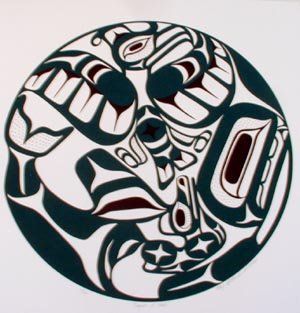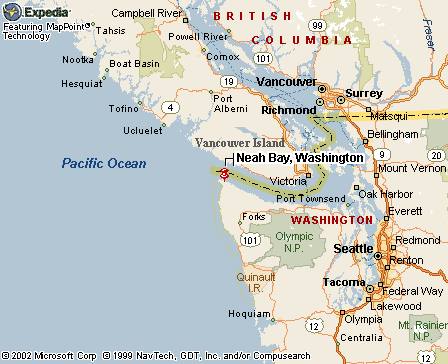|
|
Canku Ota |
|
|
(Many Paths) |
||
|
An Online Newsletter Celebrating Native America |
||
|
April 6, 2002 - Issue 58 |
||
|
|
||
|
Makah Prepare to Hunt Whales |
||
|
by Elizabeth Murtaugh The
Seattle Times
|
||
|
Legends of the Whale by Moy
Sutherland
|
|
The hunt for the whales, which may begin as early as the second week in April, would be the first off the northwest coast of Washington since the spring of 2000, a year after the tribe revived its ancient tradition amid fierce protests from animal-welfare groups. It also would be the first hunt under expanded federal marine-fisheries regulations allowing whaling in the Strait of Juan de Fuca, where waters are calmer and safer than those off Cape Flattery. "It comes with some restrictions, but it certainly opens up more than before and it's based on science, which we feel very comfortable with," said Makah Whaling Commission President Keith Johnson. Meanwhile, environmental groups are fuming, saying the tribe should wait until a federal lawsuit challenging the hunt is resolved. "We think it's outrageous that the Makah would go forward killing these whales, especially before this litigation is resolved," said Michael Markarian, vice president of The Fund for Animals, a New York-based animal-rights group. The Makah's right to whale is outlined in their 1855 treaty. The tribe moved to resume the hunt when the whales were taken off the Endangered Species List in 1994. After making their case to the International Whaling Commission, Makah whalers were allocated 20 whales through 2002, no more than five a year. They have killed one so far, on May 17, 1999, their first in more than 70 years. In the spring of 2000, a federal judge suspended whaling and ordered the National Marine Fisheries Service to conduct a new, more comprehensive environmental assessment. That study, issued last July, cleared the hunts to resume. It also expanded whaling territory to the Strait of Juan de Fuca. Under the previous regulations, whaling was allowed only near the tip of the Olympic Peninsula, off the Makah reservation. The fisheries service's second environmental assessment also declared the Makah could hunt both migrating gray whales and those that spend much of their time along the Washington coast. Environmentalists call the latter "resident" whales and argue they need stronger protections. The tribe and fisheries service call them "feeding aggregations" and insist there is no genetic distinction between the two. The lawsuit filed by The Fund for Animals and other environmental groups in January challenges the expanded hunt, calling the studies that prompted the reopening of the hunt inadequate. The fisheries service filed its response March 18, saying its studies clearly showed that allowing the Makah to hunt no more than five gray whales a year from a population of about 26,000 would not threaten the species. The tribe defends its right to whale as a sacred tradition that does not harm the environment. "We are stewards of our resources," Johnson said. "We are not hunting the last whale." A status conference is scheduled for April 23 in U.S. District Court. The tribal whaling commission has declined to identify the families making preparations for this spring's whale hunt. Preparations entail physical conditioning, routine canoe maintenance and spiritual training, Johnson said. The timing of the hunt will depend on when the whales make their way to the state's northern coast. Some gray whales were sighted this week off the coast of La Push, 20 miles south of the Makah reservation, spouting and rolling in the surf. Others have already made their way north to Alaska, where people on a tour vessel reported a cow and her calf south of Barwell Island off Cape Resurrection on Saturday. The migration will continue through next month.
|
|
|
||
|
|
||
| Canku Ota is a free Newsletter celebrating Native America, its traditions and accomplishments . We do not provide subscriber or visitor names to anyone. Some articles presented in Canku Ota may contain copyright material. We have received appropriate permissions for republishing any articles. Material appearing here is distributed without profit or monetary gain to those who have expressed an interest. This is in accordance with Title 17 U.S.C. section 107. | ||
|
Canku Ota is a copyright © 2000, 2001, 2002 of Vicki Lockard and Paul Barry. |
||
|
|
|
|
|
The "Canku Ota - A Newsletter Celebrating Native America" web site and its design is the |
||
|
Copyright © 1999, 2000, 2001, 2002 of Paul C. Barry. |
||
|
All Rights Reserved. |
||

 NEAH
BAY, WA - A month after gray whales began their 5,000-mile migration
from Mexico to the Chukchi Sea off Alaska, three Makah families from
here are preparing to set out with their cedar canoes and harpoons.
NEAH
BAY, WA - A month after gray whales began their 5,000-mile migration
from Mexico to the Chukchi Sea off Alaska, three Makah families from
here are preparing to set out with their cedar canoes and harpoons.
